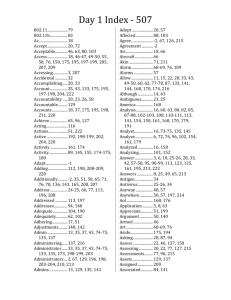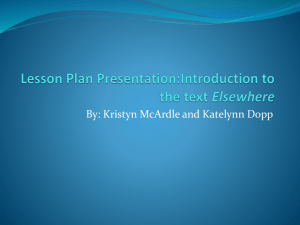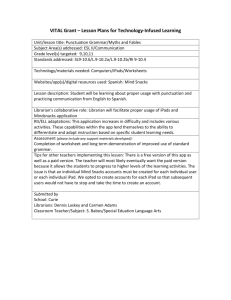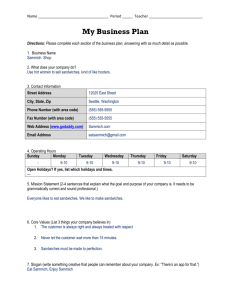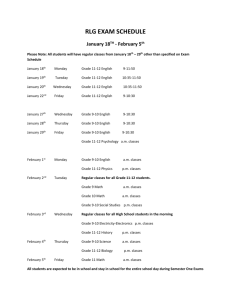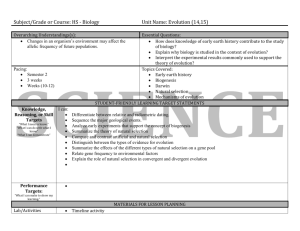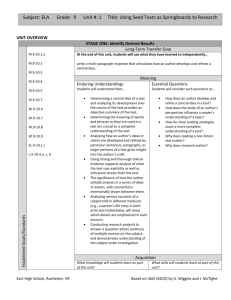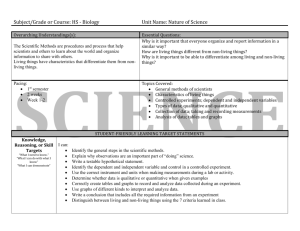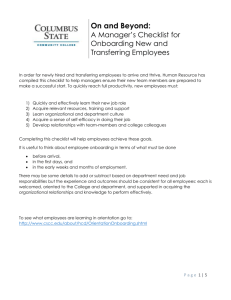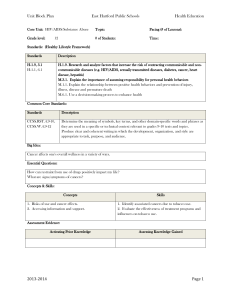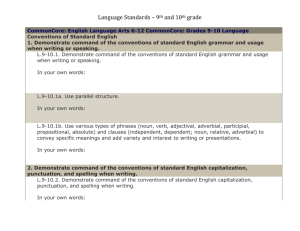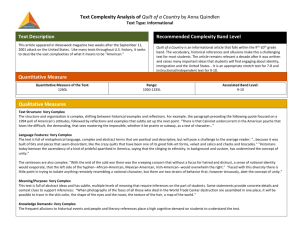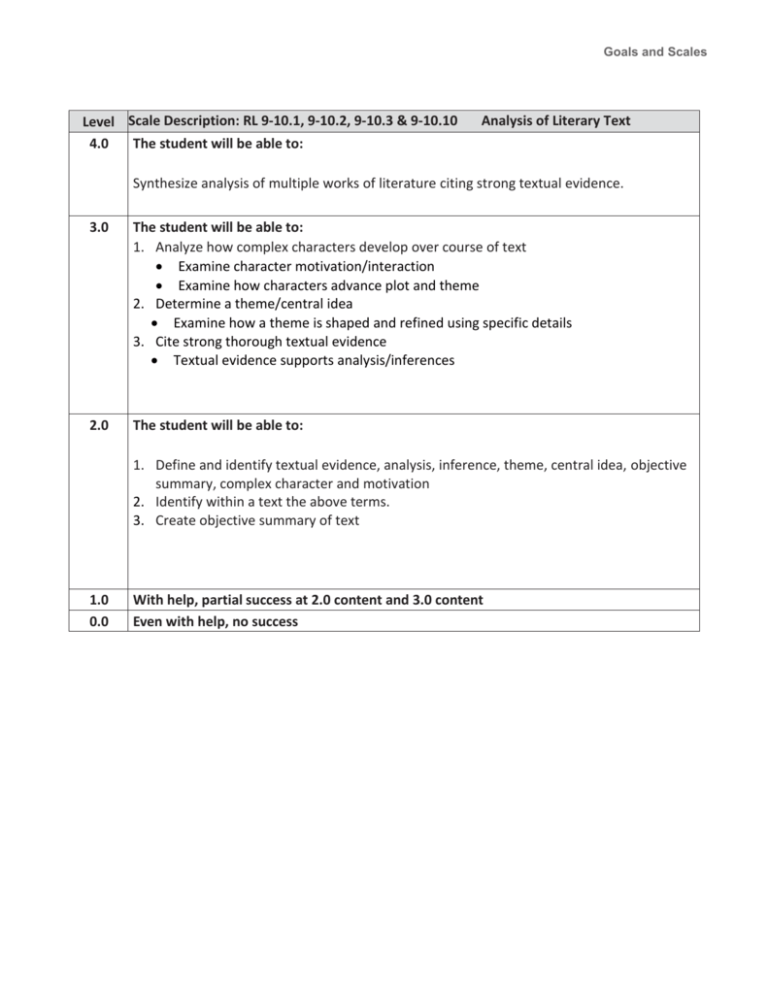
Goals and Scales
Level Scale Description: RL 9-10.1, 9-10.2, 9-10.3 & 9-10.10
4.0
The student will be able to:
Analysis of Literary Text
Synthesize analysis of multiple works of literature citing strong textual evidence.
3.0
The student will be able to:
1. Analyze how complex characters develop over course of text
Examine character motivation/interaction
Examine how characters advance plot and theme
2. Determine a theme/central idea
Examine how a theme is shaped and refined using specific details
3. Cite strong thorough textual evidence
Textual evidence supports analysis/inferences
2.0
The student will be able to:
1. Define and identify textual evidence, analysis, inference, theme, central idea, objective
summary, complex character and motivation
2. Identify within a text the above terms.
3. Create objective summary of text
1.0
0.0
With help, partial success at 2.0 content and 3.0 content
Even with help, no success
Goals and Scales
Vocabulary
Level Scale Description: L.9-10.4.A, .L.9-10.4.B, L.9-10.4.D
4.0
The student will be able to:
Regularly use vocabulary acquired in class in both spoken and written language
3.0
The student will be able to:
Use context (e.g., the overall meaning of a sentence, paragraph, or text; a word's position or
function in a sentence) as a clue to the meaning of a word or phrase.
Identify and correctly use patterns of word changes that indicate different meanings or parts
of speech (e.g., analyze, analysis, analytical; advocate, advocacy).
Verify the preliminary determination of the meaning of a word or phrase (e.g., by checking
the inferred meaning in context or in a dictionary).
2.0
1.0
0.0
The student will be able to:
Uses the definition provided in the book and locate alternate definitions.
Correctly identify parts of speech.
Recognize different types of context clues used within a text.
With help, partial success at 2.0 content and 3.0 content
Even with help, no success
Goals and Scales
Level
4.0
Scale Description: SL.9-10.1.A, SL.9-10.1.C
Speaking and Listening
The student will be able to:
Naturally lead discussion and guide other students in the discussion
3.0
The student will be able to:
Preparation:
Come to discussions prepared, having read and researched material under study
Explicitly draw on that preparation by referring to evidence from texts and other
research on the topic
Stimulate a thoughtful, well-reasoned exchange of ideas.
Participation:
Pose and respond to questions that relate the current discussion to broader themes
or larger ideas
Actively incorporate others into the discussion
Clarify, verify, or challenge ideas and conclusions.
2.0
The student will be able to:
Make connections to essential and guiding questions in the unit
Read assigned material and take notes
Prepare comments to share with the group
Prepare questions to share with the group
1.0
With help, partial success at 2.0 content and 3.0 content
0.0
Even with help, no success
©2014 Learning Sciences International
All rights reserved. Reproduction prohibited without written permission.
- B3 -
Goals and Scales
Level
4.0
3.0
Scale Description: L.9-10.1, L.9-10.1.B, L.9-10.2 & L.9-10.6
The student will be able to:
Practice rules of grammar consistently
Revise and edit their own work as well as a peer’s
Turn in error free work
Writing Conventions
The student will be able to:
Demonstrate command of the conventions of standard English grammar and usage when
writing or speaking.
Parallel structure
Use various types of phrases (noun, verb, adjectival, adverbial, participial,
prepositional) and clauses (independent, dependent; noun, relative, adverbial) to
convey specific meanings and add variety and interest to writing or presentations.
Demonstrate command of the conventions of standard English capitalization, punctuation,
and spelling when writing
Acquire and use accurately general academic and domain-specific words and phrases,
sufficient for reading, writing, speaking, and listening at the college and career readiness
level
Demonstrate independence in gathering vocabulary knowledge when considering a word or
phrase important to comprehension or expression.
2.0
1.0
0.0
The student:
Will identify errors in parallel in structure
Will identify types of phrases (noun, verb, adjectival, adverbial, participial, prepositional)
and clauses (independent, dependent; noun, relative, adverbial)
Will identify errors in capitalization, punctuation, and spelling
Will verify the preliminary determination of the meaning of a word or phrase (e.g., by
checking the inferred meaning in context or in a dictionary).
With help, partial success at 2.0 content and 3.0 content
Even with help, no success
©2014 Learning Sciences International
All rights reserved. Reproduction prohibited without written permission.
- B6 -
Goals and Scales
Level
4.0
3.0
2.0
Scale Description: RI.9-10.1, RI.9-10.2 Analysis of Informational Text
The student will be able to:
Synthesize analysis of various informational texts citing strong textual evidence.
The student will be able to:
Cite strong and thorough textual evidence
Supports inferences/analysis
Determine a central idea and analyze its development
Provide an objective summary
The student:
Will recognize or recall academic vocabulary including: central idea, inferences, rhetorical
devices, textual evidence and objective summary.
Will be able to identify within a text the above vocabulary.
1.0
0.0
With help, partial success at 2.0 content and 3.0 content
Even with help, no success
©2014 Learning Sciences International
All rights reserved. Reproduction prohibited without written permission.
- B7 -

